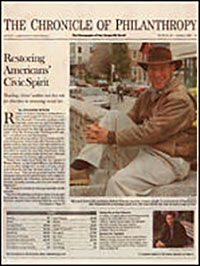Publications
 Charity Regulation Should Focus on Scam Artists
Charity Regulation Should Focus on Scam Artists
By Henry Goldstein
Reprinted with permission from The Chronicle of Philanthropy, October 2000
The National Association of State Charity Officials last month released a proposal to govern fund-raising solicitations on the Internet. Their bottom line: Charities should register in their own states when they set up fund-raising Web sites, but don't need to sign up elsewhere (The Chronicle, September 7).
Sadly, the regulators have come up with an old-economy solution to a new-economy phenomenon. Through the Internet, charities can and do receive donations from people who live all over the world, but the association doesn't seem to understand that Internet solicitation blasts away state boundaries, and therefore state regulations.
More important, the regulators seem to be focusing on a form of fund raising that is unlikely anytime soon to be a big deal. Instead of looking at ways to protect state residents from online fraud, regulators should be paying attention to how best to prevent scam artists from doing any type of charity solicitation.
It is probably not surprising that the regulators have taken such a wrong-headed approach, because, in general, state regulation and registration rules for charities have added cost without benefit. The New Era debacle, the United Way scandal that led to William Aramony's resignation in 1992, and other well-publicized abuses by charitable organizations were neither detected nor deterred by the states' reporting or registration requirements.
Nor has regulation done much to improve charities' performance. Instead of coming up with outmoded solutions to make charities do more paperwork, the state attorneys general should think more about how they can best protect their residents from fraudulent charities and ensure that all charitable donations are put to good use.
They should already know what doesn't work: Attempts to curb charities' fund-raising costs, or to otherwise impose regulations that govern charitable solicitations, have been knocked down in the courts as an intrusion on free-speech rights.
The indications of what does work are readily apparent. State officials must realize that they can't be effective without federal help. And just as important, they must recognize that it makes a lot more sense to go after bad people who do bad things -- and that there are already ample civil and criminal laws in all the states, as well as at the federal level, that will allow regulators to do just that.
One of the better ideas for government monitoring of charities came from the journalist Carl Bakal, in his 1979 book, Charity U.S.A.
He proposed the equivalent of a Securities and Exchange Commission for nonprofit organizations. The idea fell with a thud, and nothing more was heard about it. It is unlikely ever to become a reality, in large part because both the states and the charities will oppose it. Nonetheless, the commission's success in using the Internet to track down online stock scammers is a useful example of why the federal government is far more potent in preventing or catching fraud than the states are likely to be.
But we don't need an S.E.C. clone for the states to do a better job of protecting citizens from fraudulent appeals.
The success states have had in stopping unscrupulous telemarketing is instructive.
Like Internet solicitation, telephone appeals cross state lines and can emanate from anywhere. A telemarketing company in Boston might solicit for a cancer charity in San Francisco by calling people in Minneapolis.
States have not spent a lot of time making telemarketers comply with regulations, mostly because the interstate commerce laws prevent them from doing so. Though it often takes a lot of consumer prodding, they do go after illegitimate telemarketers, prosecuting offenders under both criminal and civil statutes.
Another lesson that the attorneys general would be wise to heed is that just as in telemarketing, it is usually not the charities that try to swindle money under the guise of good works.
The most egregious abuses are from companies with eleemosynary-sounding names -- dot-coms soliciting funds in behalf of charities that are either unaware of what's going on, or that have not granted permission for such solicitations. The states are way behind the curve on this sort of thing because they haven't figured out how to stop such companies -- any more than they have come up with an effective way to enforce regulations governing Internet solicitations.
Charities will probably race to follow the regulators' guidelines, largely because they don't want to get into trouble. But nobody should waste a lot of time dealing with this issue. As all the dot-coms going bankrupt demonstrate, Americans don't want to do everything online. We crave personal interaction, and that's what good fund raising is all about. The altruism and relationship-building at the heart of a charitable transaction -- even for small donors -- is not compellingly conveyed online. The Internet seems to be about getting, not giving.
Meanwhile, the National Association of State Charity Officials should be putting its efforts into getting rid of the charity scam artists. Donors want to know that their dollars, however they're given, will make a difference.
Henry Goldstein, president of the Oram Group, a fund-raising consulting company in New York, is a regular contributor to these pages. Click here to send an email.

